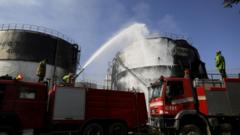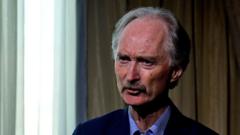Recent events in Europe underscore growing social tensions, revealing how the Gaza conflict is straining European efforts at fostering social cohesion.
Gaza War Intensifies Europe's Social Fragmentation

Gaza War Intensifies Europe's Social Fragmentation
European unity is increasingly challenged amid rising antisemitism and anti-immigrant sentiments exacerbated by the ongoing Gaza conflict.
In the aftermath of the Gaza conflict, European institutions, initially designed to bridge cultural divides and enhance social cohesion, are facing tumultuous challenges. Footings of unity are shaken as rising antisemitism and anti-immigrant politics take root in various parts of Europe, influencing social dynamics and intercommunity relationships.
Pro-Palestinian protests have erupted across Europe, with high-profile instances recorded during cultural events, such as the Eurovision Song Contest in Malmo, Sweden. This year's Eurovision, traditionally a celebration of European diversity, saw protests against Israeli participation, reflecting the escalating tensions linked to the Gaza war.
The backdrop is filled with deeply rooted conflicts emerging from the broader humanitarian crisis, as many young Muslims and others express their outrage over the high death tolls in Gaza. The discontent spills over into public spaces, instigating incidents like the recent violence surrounding a soccer match in Amsterdam, where authorities investigated alleged antisemitic hate crimes.
The backlash bears witness to a growing rift among communities, countering years of effort aimed at fostering a sense of unity and shared identity across Europe. Instances of booing and protests during cultural performances highlight a deteriorating atmosphere of artistic celebration and togetherness.
As Europe grapples with these profound social challenges amidst the Gaza conflict, it must navigate carefully to mend divisions and uphold the ideals of civility and respect intended by its postwar institutions. The current climate stresses an urgent need for dialogue and understanding, essential if the continent aims to maintain its core values of unity and peace in these tumultuous times.
Pro-Palestinian protests have erupted across Europe, with high-profile instances recorded during cultural events, such as the Eurovision Song Contest in Malmo, Sweden. This year's Eurovision, traditionally a celebration of European diversity, saw protests against Israeli participation, reflecting the escalating tensions linked to the Gaza war.
The backdrop is filled with deeply rooted conflicts emerging from the broader humanitarian crisis, as many young Muslims and others express their outrage over the high death tolls in Gaza. The discontent spills over into public spaces, instigating incidents like the recent violence surrounding a soccer match in Amsterdam, where authorities investigated alleged antisemitic hate crimes.
The backlash bears witness to a growing rift among communities, countering years of effort aimed at fostering a sense of unity and shared identity across Europe. Instances of booing and protests during cultural performances highlight a deteriorating atmosphere of artistic celebration and togetherness.
As Europe grapples with these profound social challenges amidst the Gaza conflict, it must navigate carefully to mend divisions and uphold the ideals of civility and respect intended by its postwar institutions. The current climate stresses an urgent need for dialogue and understanding, essential if the continent aims to maintain its core values of unity and peace in these tumultuous times.



















